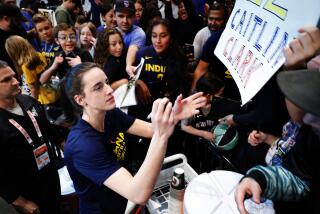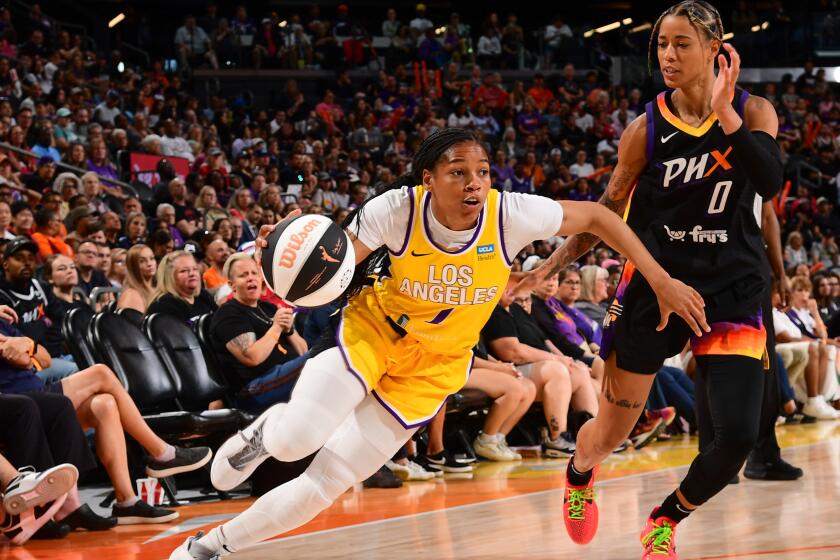Raiders’ Departure Has an Old-Fashioned Ring to It
Hard to believe, but we may end up remembering Al Davis fondly as the last of a vanishing breed of ornery, want-a-winner, individual football team owners.
Davis, of course, decided last week to take Oakland’s offer to move the Raiders from Los Angeles.
For next season it looks like the vast Los Angeles-area market will be without a National Football League team, the Rams having departed to St. Louis.
But the drought won’t last long--already efforts are being organized to bring NFL teams back to the area. And the replacements for Davis and Rams owner Georgia Frontiere will very likely reflect a new era in sports.
Walt Disney Co., which owns hockey’s Mighty Ducks and is buying 25% of baseball’s California Angels, is said to be eager to bring an NFL team to Orange County.
And in Los Angeles, Michael Ovitz, head of Creative Artists Agency, is involved in efforts to bring in a new NFL team.
Those names tell you that sports is becoming part of big-time marketing and entertainment--and that an even more extravagant era is beginning.
In Boston last week, public officials and big companies pushed forward plans for a $1.4-billion convention and sports complex with a new ballpark for baseball’s Boston Red Sox and a domed stadium for football’s New England Patriots.
Corporate investment of up to $200 million is being discussed for the complex, including a $90-million participation by ITT Sheraton, the hotel chain subsidiary of ITT Corp., which owns New York’s basketball Knicks and hockey Rangers.
The irony for Los Angeles in all this big-money talk is hard to miss. Even as county government was saying last week that it would have to close libraries and the County-USC hospital to balance the books, plans to build a stadium for Davis were begging for his approval. And at least three groups were vying to build Downtown sports arenas for the Lakers and Kings.
Another irony is that Davis, often criticized as being out for the buck, may be walking away from big bucks out of a desire to win in football more than in his bank account.
Consider that he is trading a city of millions for Oakland, a city of fewer than 400,000. In Los Angeles, the Raiders’ value would have risen to $200 million in 1997, when they were scheduled to move into a new Hollywood Park stadium the NFL was going to build.
In Oakland, the Raiders’ value may stay closer to $150 million, although Oakland will enlarge its stadium, install more luxury boxes and immediately give Davis an extra $25 million in revenues from seat licenses.
But that immediate money could be key--it’s the kind of spare cash a team can use to pay bonuses to athletes who take you to the Super Bowl. And Davis, who turns 66 on July 4, wants another Super Bowl victory, a fourth for the team he has built as general manager and principal owner for three decades.
Either way, of course, Davis is a wealthy man, having paid less than $20,000 for 10% of the Raiders in 1966.
*
But even tens of millions seem small change to the big money coming into sports now.
MCI Communications Corp., the long-distance company, is investing in a $175-million high-tech sports arena--to be called the MCI Center--in Washington for the basketball Bullets and hockey Capitals.
Comsat Corp., formerly Communications Satellite Corp., owns basketball’s Denver Nuggets, has just bought hockey’s Quebec Nordiques and is moving them to Denver, where it is building a $132-million arena.
The idea seems to be that sports teams offer programming for global satellites or on-line networks. “Watch for the Baby Bells to be the next big investors,” says a sports consultant.
Such visions bid up prices. Comsat paid $75 million for the Nordiques, a money-losing team that was last bought, by Quebec business people, for roughly $15 million in 1988.
But as marketing vehicles, sports teams can be attractive. Disney is master of the art. Mighty Ducks games at the Anaheim Pond are an animation show of Disney characters. In future, it can package Angel tickets with admissions to Disneyland.
It may inspire other corporate owners, such as Tribune Co. (Chicago Cubs) and Anheuser-Busch (St. Louis Cardinals), which have been slow to try joint marketing.
As important as selling merchandise is selling the image. “We’ll put together packages to build traffic in your stores, including team appearances and displays,” says Jerry Colangelo, owner of basketball’s Phoenix Suns.
That’s the kind of prospect Sheraton is looking at as it ponders a $90-million investment.
And marketing money, in turn, is fueling grandiose plans for sports complexes such as Boston’s Megaplex, which will be on waterfront land--if voters approve a bond issue to help finance it.
Corporate risk taking goes only so far. All over the country, taxpayers’ credit is being tapped for sports arenas, sometimes--as in San Antonio and St. Petersburg, Fla.--years before the cities have teams to play in them.
But why do voters, who don’t approve school bonds, say yes to arenas? It’s an investment, says sports finance expert Paul Much of Houlihan Lokey Howard & Zukin. “Major league sports events draw 20% to 30% of their attendance from out of town, and each visitor spends $250 per visit, on average,” he says.
*
And something more than accounting is at work: social status. “The sports event has become what the symphony orchestra was to another class and time,” says an arena planner, “a place people show off and take business friends.”
Luxury boxes are not deductible for tax purposes, although big player contracts are depreciable for tax purposes--one reason sports draws rich investors.
But for good marketing, team owners have to offer attractions the way Disney and the Los Angeles Dodgers do, reaching out to young fans and getting their parents to the games as well.
Al Davis, a hardscrabble football coach at heart, didn’t do much of that. So his breed is passing as the corporations come in--with plans for international markets next. Mexico City is an expansion prospect for all major leagues.
The business of games will get even bigger. Still, it would be nice if business ingenuity just once could devise new financing for schools and libraries.
Maybe one of the sports millionaires could endow a few libraries as Andrew Carnegie, a so-called robber baron who made his money in steel, did a century ago.
More to Read
More to Read
More to Read
Get our high school sports newsletter
Prep Rally is devoted to the SoCal high school sports experience, bringing you scores, stories and a behind-the-scenes look at what makes prep sports so popular.
You may occasionally receive promotional content from the Los Angeles Times.






